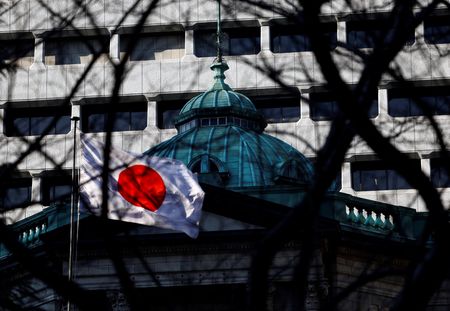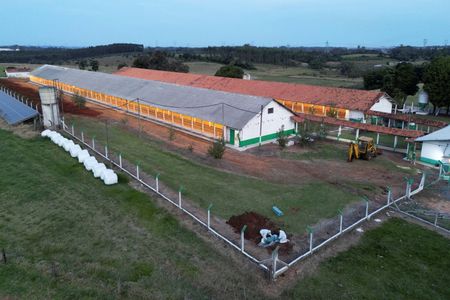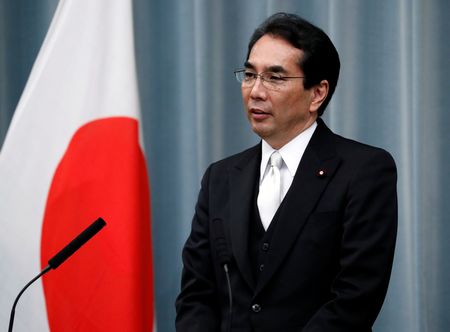By Leika Kihara
TOKYO (Reuters) -Some market players urged the Bank of Japan to increase buying of super-long bonds, or terminate tapering for that maturity, in the wake of sharp rises in their yields, the central bank said on Tuesday.
The requests, made in the BOJ’s survey of bond market participants on its taper plans, underscore the challenge the central bank faces in removing remnants of its massive monetary stimulus.
“Market liquidity for super-long bonds has declined sharply, so the BOJ should consider responding nimbly, such as by halting taper, increasing the amount it buys,” or tweaking the distribution of bonds it buys, the central bank quoted one participant as saying in its survey summary.
The yields on super-long Japanese government bonds (JGB) soared to all-time highs on Tuesday on weak investor demand, as political calls for big fiscal spending flare up ahead of an upper house election slated for July.
The spike in yields comes at a delicate time for the BOJ, which will review next month an existing taper programme running through March, and come up with a plan for next fiscal year and beyond.
In the survey, most market participants saw no need to tweak the BOJ’s existing taper programme.
They were divided on the desirable pace of tapering from fiscal year 2026, with some calling for the bank to eventually stop buying JGBs altogether, while others said it should continue to buy up to 3 trillion yen ($20.77 billion) per month.
But most opinions called for maintaining or slightly slowing the pace of tapering, the summary showed, heightening the chance the BOJ will proceed slowly in reducing its huge balance sheet.
Under the current plan laid out last year, the BOJ has been slowing bond purchases by around 400 billion yen per quarter to halve monthly buying to 3 trillion yen by March 2026 – a pace that will diminish its $3.9 trillion balance sheet by up to 8%.
“Taking into account the risk of supply-demand conditions worsening in times of market instability, the BOJ should cut its quarterly taper size to around 200 billion yen,” one survey respondent said.
The findings from the survey were released as part of briefing materials the BOJ prepared for a two-day meeting with bond market participants that kicked off on Tuesday.
The survey and the outcome of the meeting will be taken into account when the BOJ reviews its quantitative tightening plan at its next policy meeting on June 16-17.
The BOJ has lagged well behind its global counterparts in whittling down crisis-era stimulus, having only exited last year a decade-long, massive stimulus aimed at pulling the economy out of stagnation. It also ended negative interest rates last year, though short-term borrowing costs are still stuck at 0.5%.
While the BOJ also began tapering its huge bond buying last year, it still owns roughly half of outstanding JGBs.
($1 = 144.4400 yen)
(Reporting by Leika Kihara; Editing by Jacqueline Wong and Tomasz Janowski)









